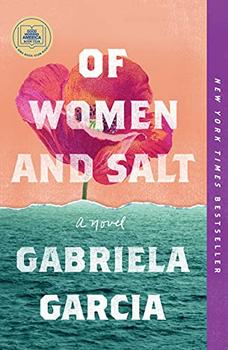Book Club Discussion Questions
Want to participate in our book club? Join BookBrowse and get free books to discuss!
Please be aware that this discussion guide will contain spoilers!
- The novel begins with this sentence: "Jeanette, tell me that you want to live." How does this intimate direct address from mother to daughter set the tone for some of the themes that we encounter in the following pages? Do you think it connects to concepts of endurance or survival in the other women's stories?
- Maria Isabel loses two of the most important people in her life and gives birth to her daughter, Cecilia. How do you think loss impacts and informs the decisions that women make throughout the book?
- The book exposes the flaws and inequities in the immigration system. How does Gloria's deportation act as a catalyst for Garcia's story? What effect does her deportation seem to have on the other characters?
- Compare and contrast the mother-daughter relationships in this novel. Which relationship did you connect with the most?
- The first edition copy of Les Miserables appears in multiple scenes; the first time we see it is in Cuba in 1866 and the last time we see the book is in present-day Miami. What do you think the author is saying about the way stories transcend generations? What is the significance of the book itself?
- Which chapter surprised you the most? Why?.
- How did you feel about jumping through time and place in this novel? What value can narratives that defy chronological or sequential order have in telling a story?
- What do you think is the significance of the recurring phrase "We are force"?
- Think about the sections where the character is speaking from their first-person point of view. Why do you think the author allows certain characters--like Gloria and Maydelis--to tell us their stories in their own voices, instead of narrating from a distant third-person narrator?
- What did you think of the novel's ending? Could things have turned out differently for Jeanette? How?
- Which character did you relate to the most? Why?
- Many of the book's female characters struggle in some way in their relationships with men. How do you feel men are portrayed in the story in general? What effects do they seem to have on women's lives?
- Garcia's book is relatively short at just over 200 pages, but includes the viewpoints of multiple characters over multiple generations. How do you think the novel's wide scope impacts the significance or intensity of the specific details provided? How does it subvert ideas about the ways in which multigenerational tales are expected to be told?
- How does Jeanette's struggle with addiction mirror or bear similarity to the struggles of the women in her family before her? How do you think her family background contributes to the way she grows up and the adult she eventually becomes?
- The ending of the book balances a sense of loss with the possibility of new beginnings. What do you imagine Ana's future might look like?
- Which problems that the characters deal with could be eliminated or prevented through political solutions or changes? Which problems do you think would exist regardless of political and social factors?
- Did the book add any new information or perspectives to your understanding of the U.S. immigration system? If you have read other fiction that focuses on immigration, how does Of Women and Salt compare?
- Many of the characters in the book engage in acts that are illegal. What do you think this shows about the nature of criminality and the powers that define who or what is criminal?
- In what ways do the characters refuse to let laws or borders decide their fates? How does Garcia allow them autonomy within their limited circumstances, and what do you think about the choices they make under pressure?
- What did you feel Garcia's use of suspense added to the book? What was your favorite suspenseful moment?
- Garcia shows how the decisions women make on their own, sometimes secretly, can have powerful effects on family members (with or without their knowledge) and even impact future generations. What do you think this perspective adds to popular notions of history, politics and immigration?
This reading guide combines topics provided by the publisher with additional topics suggested by BookBrowse
Unless otherwise stated, this discussion guide is reprinted with the permission of Flatiron Books. Any page references refer to a USA edition of the book, usually the trade paperback version, and may vary in other editions.
